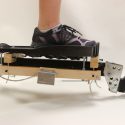WARF’s support for startups expands
The announcement of a new source of investment capital for campus information technology entrepreneurs, or researchers aspiring to join their ranks, adds to a growing list of initiatives to speed the transfer of technologies from UW–Madison labs for the benefit of the public and advancing the pace of university innovation.
The new $30 million venture capital fund, which will be backed equally by the Wisconsin Alumni Research Foundation (WARF) and the State of Wisconsin Investment Board (SWIB), is called “4490 Ventures,” a nod to the 44-degree north latitude and 90-degree west longitude lines near the center of the Badger State.
“One of the drivers of this for WARF, first of all, is return,” says Managing Director Carl Gulbrandsen, who notes that capturing value from IT innovations may call for a different approach from the licensing activity used in other industries.
“It’s a hard slog, but we are working to address these weaknesses. It will take a multi-pronged approach and it’s all about partnerships.”
Carl Gulbrandsen
“These are IT companies and patents are not as essential to their business as the ordinary startup companies that WARF normally gets involved in,” he says. “So this is one way for WARF to bring value back to WARF and the university.”
The UW is one of the nation’s largest research universities in terms of total dollars spent on research (around $1 billion), but the number of startups spun off each year from the campus is sometimes criticized as too low.
“We can always do better, but we have to be realistic about the circumstances we live with,” says Gulbrandsen, noting that WARF targets its efforts to support the most viable options for technology transfer, rather than encouraging startups in cases where the barriers to success are too high.
Gulbrandsen says factors holding back the creation of new companies include a paucity of regional innovation as measured by private sector patent activity, a lack of venture capital, and a need for more serial entrepreneurs who have experience creating companies.
“It’s a hard slog, but we are working to address these weaknesses,” he says. “It will take a multi-pronged approach and it’s all about partnerships.”
Over the past 20 years, WARF’s efforts have helped create 108 new companies by licensing university technologies, says Leigh Cagan, WARF’s chief technology commercialization officer. More than 60 of those firms are still in operation.
“We are very selective,” Cagan says. “Do they create products and jobs and have real potential to generate long-run value? Or are they flash-in-the-pan things that can’t attract the capital and management talent needed to succeed? To us, this is a long-run game.”
“Do they create products and jobs and have real potential to generate long-run value? Or are they flash-in-the-pan things that can’t attract the capital and management talent needed to succeed? To us, this is a long-run game.”
Leigh Cagan
WARF also has a $35 million internal venture portfolio with three funds that have invested in a number of startups, says Carrie Thome, WARF’s director of investments. In addition, 10 percent of WARF’s broader portfolio is allocated for private equity and some of that goes to back regionally focused firms, Thome says.
“But we know we can do more,” she says.
To further help startups, UW–Madison Provost Paul DeLuca says the university is launching a program named “D2P,” which stands for Discovery to Product.
He calls the university a “gigantic” engine of discovery.
“This process works very well when you are talking about patents and royalties,” DeLuca says. “In collaboration with WARF, we do that more efficiently than anyone else.”
He says the D2P effort, which will start with a three-year pilot program this fall, aims to change the university research environment by strengthening the process of commercializing discoveries.
“We need a mechanism to reach into those labs and identify entrepreneurial clusters,” DeLuca says. “We also need a mechanism to ‘fail fast,’ because we know some of these companies won’t go anywhere.
“We have a lot of disparate activity, but no systematic organizational structure that deals with pushing these products out the door. This is exactly what D2P will do.”
Michael Falk, WARF’s general counsel, says the University of Wisconsin Law School’s Law and Entrepreneurship Clinic has helped numerous clients inside and outside of the university since it was founded four years ago.
“We also realized many of these people need business counseling to help with market analysis or to create a business plan,” he says, noting that WARF has provided support for the effort.
The Wisconsin School of Business also has stepped up, Falk says, and is partnering with the Law School to help clients with a joint program so clients will “get the full spectrum of entrepreneurial skills and services to create that basic foundation for a strong company.”
He also touts the Wisconsin Institutes for Discovery’s Town Center and its educational programs to help entrepreneurs.
—Brian E. Clark


